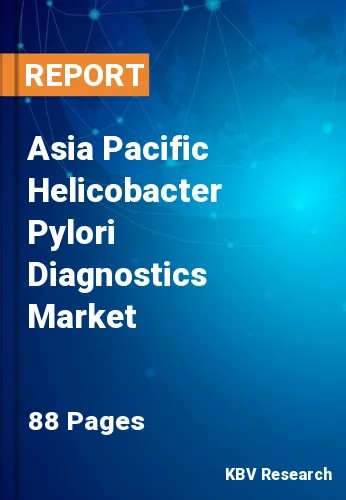The Asia Pacific Helicobacter Pylori Diagnostics Market would witness market growth of 6.3% CAGR during the forecast period (2023-2030).
The main factors driving the market are the increased prevalence of infectious diseases and people's growing knowledge of infections. The most prevalent infectious disorders brought on by bacteria are gonorrhea, chlamydia, tuberculosis, various STDs, gastroenteritis, and urinary tract infections (UTIs).
An immunoassay test uses biochemistry to determine the amount and concentration of an analyte. Large proteins, antibodies a person has developed in response to an infection, or tiny molecules can all be analytes. Immunoassays are very precise and sensitive. Their high specificity is due to the reagents they use, which include antibodies and purified antigens. This assay can be used to directly diagnose a disease by assessing the presence of antigens. Additionally, employing an antibody or antigen as a biorecognition agent is a highly selective bioanalytical approach that assesses the presence or quantity of analytes ranging from tiny molecules to macromolecules in solution.
It stated that a major portion of cases of gastritis caused by Helicobacter pylori positivity is often consistent with the prevalence of the infection. Since these infections are typically detected using immunoassays, rising rates of gastritis and Helicobacter pylori infection are expected to drive segment growth during the projection period.
The likelihood of survival for stomach cancer substantially depends on the stage or phase of the disease at the time of diagnosis. The likelihood of survival rises with the early stages of sickness development. Most instances identified at a later stage of the disease in the Asia Pacific are in senior patients. The region's aging population rise is strongly correlated with increased cases of stomach cancer. Due to this factor and the growing need for early identification driven by increased health awareness, the market will grow over the forecast period in the APAC.
The China market dominated the Asia Pacific Helicobacter Pylori Diagnostics Market by Country in 2022, and would continue to be a dominant market till 2030; thereby, achieving a market value of $62.2 Million by 2030. The Japan market is exhibiting a CAGR of 5.6% during (2023 - 2030). Additionally, The India market would showcase a CAGR of 6.9% during (2023 - 2030).
Based on Test Type, the market is segmented into Non-invasive and Invasive. Based on End User, the market is segmented into Diagnostics Laboratories, Hospitals, and Others. Based on Method, the market is segmented into Laboratory Based Test and Point of Care Test. Based on countries, the market is segmented into China, Japan, India, South Korea, Singapore, Malaysia, and Rest of Asia Pacific.
Free Valuable Insights: The Worldwide Helicobacter Pylori Diagnostics Market is Projected to reach USD 805.9 Million by 2030, at a CAGR of 5.5%
The market research report covers the analysis of key stake holders of the market. Key companies profiled in the report include Cardinal Health, Inc., Biohit Oyj, Abbott Laboratories, Quidel Corporation, Gulf Coast Scientific, Inc. (Gulf Coast Medical Center), Meridian Bioscience, Inc. (SD Biosensor Co., Ltd.), Avanos Medical, Inc., Thermo Fisher Scientific, Inc., Bio-Rad Laboratories, Inc. and F. Hoffmann-La Roche Ltd.
By Test Type
By End User
By Method
By Country
Our team of dedicated experts can provide you with attractive expansion opportunities for your business.

